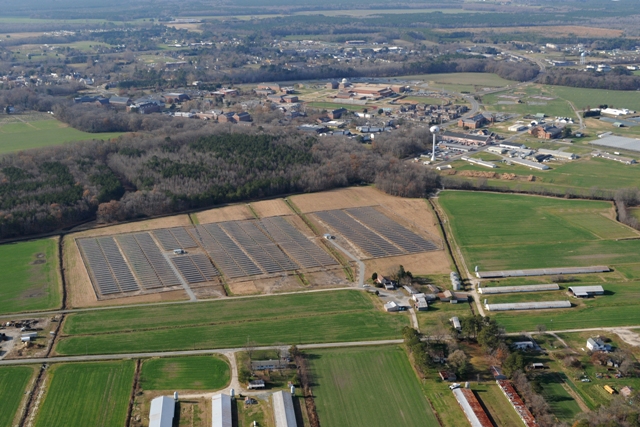Farming has played a central role at the University of Maryland Eastern Shore since its founding in 1886.
Crops and livestock were grown for sustenance in the early years, and more recently for cutting-edge research. In the 21st century, the university looked skyward for a new kind of harvest – harnessing the sun’s energy.
UMES and a private-sector partner, SunEdison, activated a solar collection system in the spring 2011 that demonstrates the institution’s commitment to being a leader in the production and consumption of eco-friendly energy.
A grid of 7,800 panels sits on 17 acres previously used to grow corn and other crops on the southeast side of campus off West Post Office Road (MD Rt. 388).

The panels are configured to rotate slowly, following the sun across the sky, to maximize the amount of energy collected – even on a cloudy day.
At the time it began producing energy, the site was the largest concentration of photovoltaic modules in one location in Maryland, according to SunEdison.
The activation culminated four years of efforts by UMES’ technology and commercialization division to find efficient ways of reducing energy costs. The solar farm is capable of generating an estimated 15 percent of the electricity the campus uses.
The solar farm was financed at no cost to taxpayers or UMES, which retains ownership of the land.
In return, UMES agreed to purchased power from the solar farm company at long-term, predictable rates to offset the university’s demand from the energy grid. It is designed to reduce UMES’ reliance on commercially produced electricity for two decades.
When the campus is closed and electricity demand is low, UMES has the capability of transferring electricity generated by the solar farm to the energy grid and receiving credit toward future bills.
The solar farm’s success has UMES looking for other ways to cut its energy costs. One possibility is through a partnership with a company that makes wind-powered turbines.
UMES leaders also are hopeful such alternative energy projects will spur business growth and entrepreneurs to step forward with economic development ideas that will benefit the community the university serves.

